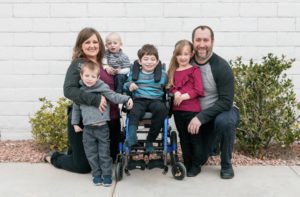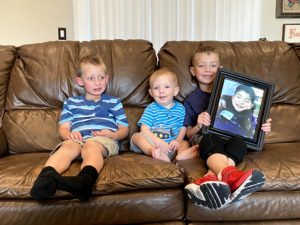For Part 2 of “Save Our Medicine,” we continue talking with Tiffany, DeAnna, and Sara about their families’ NPC journeys, as well as the push for medication access. If you would like to read Part 1 first, please head here.
Genetic Testing
By the time Tiffany had broached the topic of genetic testing, Jacob was already in a wheelchair, had a belly tube, and was having frequent seizures. Tiffany says:
Even our neurologist was going so slow. When we wanted to do whole exome sequencing, like Sara and Marian, we were told that it would be $10,000, had a 33% chance of being accurate, and insurance wouldn’t cover it. So we came back home. Jacob wasn’t talking anymore. I kept fighting my insurance until they sent me to see a muscular geneticist who worked in the same office as the doctor who diagnosed Marian.
At this point, Tiffany was again told that she needed whole exome sequencing. When she mentioned that other doctors and her insurance had fought her on it, the new doctor promised that she would get the tests for them.

After an arduous fight, the family finally received a diagnosis of NPC. They then decided to test their other children and discovered that two of their other sons also have NPC. Tiffany says:
In the meantime, we started treatment with Sara and Marian. We were driving down to California every two weeks to get treatment. If we had known, we could have gotten him treatment earlier.
Deanna explains that she also had issues pursuing genetic testing. Even while Osama was in the NICU, with an abdomen 3x the size of his body, the doctors were hesitant to perform genetic testing. She shares:
The poor kid, they poked him every day and started taking blood draws from his head, arms, everywhere to see if it was liver disease. But when we had a genetic counselor come in, we were told there was no reason to test and insurance wouldn’t cover it. The numbers would get better. You just kind of think that the doctor knows better. What were we going to do? It’s just upsetting because we could have had answers so much earlier.
Adrabetadex
Adrabetadex is one of the experimental therapies which showed real, lived promise for families touched by NPC. Arimoclomol was another experimental therapy for NPC which was not approved this year. Mallinckrodt Pharmaceuticals acquired adrabetadex (also known as VTS-270) in 2018 and has been developing it ever since. Unfortunately, following a Phase 2b/3 clinical trial, Mallinckrodt decided to no longer manufacture the drug.
According to a story in Today, the company determined that trial data was not strong enough to continue drug development. That its benefits did not outweigh its risks. As a result, said the company, adrabetadex would no longer be manufactured. Sara, Deanna, Tiffany, and many other families, doctors, and foundations sprung into action. While today Mandos, LLC has acquired the rights to adrabetadex, its availability will still wane – or disappear – until the company decides how to proceed. The mothers tell me:
We missed so many years and nobody would help us. So in January, we were all devastated when we got the letter. They’re giving up on us. Please don’t give up on us.
Shortly after Mandos acquired this medicine, the FDA sent a letter placing it on a partial clinical hold. Tiffany’s son Ethan (1) was very impacted by this FDA letter, delaying his treatment for months. Other children are also facing difficulties if access is taken away. Sara, in particular, believes that the trial data is not being seen through the right lens. She states that the Phase 3 trial data shows neither the treated arm nor the placebo arm got sick; the treated patients were just stabilized. Then she explains:
Our kids aren’t in the trial but are being treated with adrabetadex. Marian couldn’t walk. She couldn’t stand on her own and was taking 4-hour long naps, waking up exhausted. She was choking on food, lost her words, wasn’t gaining weight, and couldn’t respond to a simple yes/no question. Marian was sick. After five treatments, she started walking.

Deanna also positive results, sharing:
Osama, before starting, was not walking and not talking, aside from a couple of sounds. After his third or fourth treatment, he was able to do this puzzle. He hadn’t been able to do it on his first birthday; he would just pick up the pieces and bang them. After the infusion, he picked up the pieces and even turned them and put them where they belong. Now he’s five, he’s running along with the kids, writing his name, learning songs and remembering them.

Making the Case for NPC
One common theme throughout our discussion is frustration: at having their thoughts and lived experiences blown off, at the lack of education and awareness, and over facts and statistics being looked at over the lives of those directly affected.
For example, shares Deanna:
It’s frustrating when I get comments from people who say things like, ‘Oh, well he looks normal to me.’ Well, he is normal. NPC doesn’t define him. But he also works extremely hard and these kids put in everything they’ve got to fight to be there, to be like their friends and their siblings.
Tiffany has also dealt with these comments and finds them similarly short-sighted or frustrating:
It’s hard to have a rare disease. And when it’s degenerative in form, it’s hard because they may have a skill this month, but next month they don’t. With people thinking that our kids ‘look normal,’ they don’t rush. People don’t have patience because they don’t think anything is wrong.
The Dangers of Waiting
Of course, waiting presents its own set of complications. The FDA has closed this treatment program to most new patients unless they are regressing within the first few years of life. The mothers ask:
Why would you wait for an infant or toddler to regress before you let them have medicine? Why are we looking for damage before we ever treat? The rest of us already dealt with that so we should be able to set that example for others so that they don’t have to do that. Waiting makes the difference between a pretty typical life experience vs. children who are non-communicative and non-mobile.
For example, Sara wonders what her life would be like with Marian without the treatment. How would their relationship be? Would her family know her in the same way? She explains that it is scary to think about that and to even think forward to that; what will happen if medication access is stopped completely?
To Tiffany, these questions reflect her experience. She describes it as “Mom’s remorse” – looking back and not being able to do, or know, in the moment what she does now. She says:
I can see things that Jacob never did but Mason is doing them. Logan is on an entirely different level. Mom’s remorse is constantly playing in my mind. Could I have done more? What could I have changed?

Let’s be clear: there is no time to wait here. The three mothers I spoke to today reflect that, but so do the numerous other stories of parents whose children have NPC. If you’re interested in reading more stories about what adrabetadex has done for children with NPC, please check out the Save Our Medicine “Press” page.
Stay tuned for the final part of “Save Our Medicine,” discussing the movement itself and the new “You Are My Sunshine” video, coming soon.


